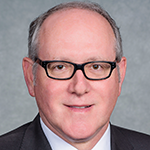At an ACR town hall on Jan. 27, leaders of the ACR and the American Board of Internal Medicine (ABIM) described changes to the ABIM’s rheumatology maintenance of certification (MOC) assessment requirements, with a focus on the new Longitudinal Knowledge Assessment (LKA).
The LKA launched in December 2021 and offers a novel, five-year, ongoing approach to rheumatology MOC assessment.1 Participants receive a block of assessment questions each quarter, accessible from any internet-connected device, and get instant answer feedback, as well as pass/fail results at the end of the five-year cycle. The LKA is also available for MOC in internal medicine and several other specialties.
MOC Reform
For more than 30 years, ABIM rheumatology MOC assessment has required taking a comprehensive exam at a designated testing center every 10 years. Recently, ABIM has been working on alternative MOC assessments that may better serve physicians’ needs in terms of clinical knowledge, time and convenience.

Dr. Saag
The ACR has been actively involved in rheumatology MOC assessment reform, with several members serving on the ABIM’s Rheumatology Certification Board. While presiding over the town hall, ACR President Kenneth G. Saag, MD, MSc, shared, “The ACR has been working with members since 2014 to promote meaningful change in ABIM MOC options. The ACR remains committed to making MOC a meaningful process for rheumatologists so that they may better serve their patients.”
About the LKA, he added: “We are cautiously optimistic that the LKA may address a number of the elements that our members value: a more flexible approach to continuous professional development and an alternative to the high-stakes, closed-book 10-year exam.”
The traditional, 10-year exam remains an option for MOC, but the two-year Knowledge Check-In is no longer offered.
How Does the LKA Work?
The LKA includes 600 questions offered over a five-year period. A new block of 30 questions is released every quarter. You may answer the questions at your own pace at any time during the quarter. However, once you open a question, you must answer it within four minutes to receive credit; opened but unanswered questions will be counted as incorrect.
Once you are enrolled in the LKA, questions can be accessed from any internet-connected device at your convenience. No appointments or travel are required. In addition, of the 600 questions offered, you only need to open 500 of them to fulfill participation requirements. This provides some flexibility to schedule your assessment around especially busy quarters.
